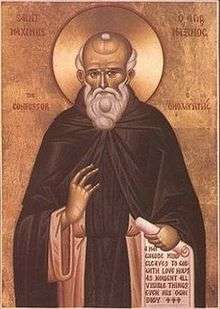August 29 (Eastern Orthodox liturgics)
August 28 - Eastern Orthodox liturgical calendar - August 30
All fixed commemorations below are observed on September 11 by Eastern Orthodox Churches on the Old Calendar.[note 1]
For August 29, Orthodox Churches on the Old Calendar commemorate the Saints listed on August 16.
Saints
- The Beheading of the Glorious Prophet, Forerunner, and Baptist John (ca. 28)[1][2][3][4][note 2][note 3]
- Saints Candida (418) and Gelasia (422), of Constantinople.[1][7]
- Saint Theodora, nun, of Thessaloniki, who was from Aegina (892)[1][3][7][8][note 4] (see also: April 5)
- Saint Arcadius of Arsinoe, Cyprus, Bishop and Wonderworker.[1][3][7][9]
- Saint Basil I the Macedonian, Byzantine Emperor (886)[3][10][note 5]
Pre-Schism Western saints
- Saint Sabina, matron and martyr from Rome (c. 126)[11][note 6]
- Saint Sabina of Troyes, by tradition the sister of St Sabinian of Troyes in France where she was venerated together with him (c. 275)[11][note 7]
- Saint Candida, one of a group of martyrs who suffered on the Ostian Way outside the gates of Rome.[11][note 8]
- Saint Euthymius, a Roman who fled to Perugia in Italy with his wife and his child, St Crescentius, during the persecution of Diocletian (4th century)[11][note 9]
- Saint Adelphus, an early Bishop of Metz and Confessor (5th century)[6][11]
- Saint Sæbbi of Essex (Sebbi, Sebba), King of Essex and monk (c. 694)[1][6][7][11][12][13][note 10]
- Saint Medericus (Merry), a monk at St Martin's in Autun, where he eventually became abbot (c. 700)[6][11][note 11]
- Saint Velleicus (Willeic), born in England, he followed St Swithbert to Germany and became Abbot of Kaiserswerth (8th century)[11]
- Saint Eadwold of Cerne (Edwold), hermit at Cerne in Dorset in England (9th century)[11][note 12][note 13]
- Saint Alberic, a monk who lived at Bagno de Romagua in Italy (1050)[11]
Post-Schism Orthodox saints
Other commemorations
- Commemoration of all Orthodox soldiers killed on the field of battle.[1][7]
- Translation of the relics (1699) of St. Joseph Samakus the Sanctified, of Crete (1511)[1][5][7][note 14]
- Repose of Hiero-Schemamonk Poemen of Cernica (1831)[1]
- Repose of Righteous Pachomius the Silent, of Valdai Monastery (1886)[1]
Icon gallery
 Beheading of the Glorious Prophet, Forerunner, and Baptist John (Dionysiou monastery)
Beheading of the Glorious Prophet, Forerunner, and Baptist John (Dionysiou monastery) Head of Saint John the Baptist.
Head of Saint John the Baptist. Gold solidus of Emperor Basil I the Macedonian.
Gold solidus of Emperor Basil I the Macedonian.
Notes
- The notation Old Style or (OS) is sometimes used to indicate a date in the Julian Calendar (which is used by churches on the "Old Calendar").
The notation New Style or (NS), indicates a date in the Revised Julian calendar (which is used by churches on the "New Calendar"). - He was slain before the Pasch. His head was found and enshrined at Edessa today.[5]
- "THE beheading of St. John the Baptist, who was put to death by Herod about the feast of Easter. However, the solemn commemoration takes place today, when his venerable head was found for the second time. It was afterwards solemnly carried to Rome, where it is kept in the church of St. Silvester, near Campo Marzio, and honored by the people with the greatest devotion."[6]
- Her memory was celebrated on August 29, but was moved to August 3, due to the feast of the Beheading of the Glorious Prophet, Forerunner, and Baptist John.
- He is not included in the Synaxaria. However his memory is recorded in the Byzantine Church Calendar of Gideon (Βυζαντινὸ Ἑορτολόγιο τοῦ Γεδεῶν), p. 161, as a founder and renovator of many churches and monasteries. Basil (867-886) was included with the saints in some Menologia for his piety and his enrichment of the capital (Constantinople) with sacred buildings to the Glory of God.
- "At Rome, on Mount Aventine, the birthday of St. Sabina, martyr. Under the emperor Adrian, she was struck with the sword, and thus obtained the palm of martyrdom."[6] The famous Basilica on the Aventine in Rome is dedicated to her.
- "In the vicinity of Troyes, St. Sabina, a virgin, celebrated for virtues and miracles."[6]
- "Also, at Rome, St. Candida, virgin and martyr, whose body (relics) was transferred to the church of St. Praxedes by pope Paschal I."[6]
- "At Perugia, St. Euthymius, a Roman, who fled from the persecution of Diocletian with his wife and his son Crescentius, and there rested in the Lord."[6]
- King of Essex in England. After a peaceful reign of thirty years he became a monk at the monastery of Westminster ('the monastery in the West') which he had founded. His life was one of prayer, repentance and almsgiving.
- Later he lived as a hermit near Paris, where now stands the church of Saint-Merry.
- Possibly the brother of St Edmund the Martyr, King of East Anglia.
- Rev. Richard Stanton lists him under Nov. 27th in his Menology of England and Wales as follows:
- "EDWOLD was brother of St. Edmund, King and Martyr, who, after witnessing the misfortunes of his house and country, resolved to forsake this deceitful world, and prepare for eternity by a life of solitude and rigorous mortification. The retreat he chose was Cerne or Cernel, in Dorsetshire, a spot said to have been formerly visited by St. Augustine, in his attempt to convert the people of those parts. There Edwold lived in a solitary cell, tasting nothing but bread and water, and giving himself up to exercises of devotion. He died with a reputation of great holiness; and the veneration with which he was regarded in later years induced Egelward, a wealthy nobleman, to build a monastery in honour of St. Peter over the place of his burial."[14]
- His feast day is on January 22.
gollark: The Bee Control Programming Language (BCPL) allows control of all bees.
gollark: https://tenor.com/view/lol-bees-cgp-grery-gif-14896640
gollark: This will not* spontaneously become bees.
gollark: I'm working on it. Please hold while I reeeencode things.
gollark: https://radio-ic.osmarks.net/bees.ogg
References
- August 29 / September 11. Orthodox Calendar (PRAVOSLAVIE.RU).
- Great Synaxaristes: (in Greek) Ἀποτομὴ Κεφαλῆς Ἰωάννου Προδρόμου. 29 Αυγούστου. ΜΕΓΑΣ ΣΥΝΑΞΑΡΙΣΤΗΣ.
- (in Greek) Συναξαριστής. 29 Αυγούστου. ECCLESIA.GR. (H ΕΚΚΛΗΣΙΑ ΤΗΣ ΕΛΛΑΔΟΣ).
- The Beheading of the Holy Glorious Prophet, Forerunner, and Baptist John. OCA - Lives of the Saints.
- The Autonomous Orthodox Metropolia of Western Europe and the Americas (ROCOR). St. Hilarion Calendar of Saints for the year of our Lord 2004. St. Hilarion Press (Austin, TX). p. 64.
- The Roman Martyrology. Transl. by the Archbishop of Baltimore. Last Edition, According to the Copy Printed at Rome in 1914. Revised Edition, with the Imprimatur of His Eminence Cardinal Gibbons. Baltimore: John Murphy Company, 1916. pp. 262.
- September 11 / August 29. Holy Trinity Russian Orthodox Church (A parish of the Patriarchate of Moscow).
- Great Synaxaristes: (in Greek) Ἡ Ὁσία Θεοδώρα ἡ ἐν Θεσσαλονίκῃ. 29 Αυγούστου. ΜΕΓΑΣ ΣΥΝΑΞΑΡΙΣΤΗΣ.
- Great Synaxaristes: (in Greek) Ὁ Ἅγιος Ἀρκάδιος ὁ Θαυματουργός Ἐπίσκοπος Ἀρσινόης Κύπρου. 29 Αυγούστου. ΜΕΓΑΣ ΣΥΝΑΞΑΡΙΣΤΗΣ.
- Great Synaxaristes: (in Greek) Ὁ Ἅγιος Βασίλειος ὁ Μακεδὼν ὁ αὐτοκράτορας. 29 Αυγούστου. ΜΕΓΑΣ ΣΥΝΑΞΑΡΙΣΤΗΣ.
- August 29. Latin Saints of the Orthodox Patriarchate of Rome.
- Great Synaxaristes: (in Greek) Ὁ Ἅγιος Sebbi (Ἄγγλος). 29 Αυγούστου. ΜΕΓΑΣ ΣΥΝΑΞΑΡΙΣΤΗΣ.
- Rev. Richard Stanton. A Menology of England and Wales, or, Brief Memorials of the Ancient British and English Saints Arranged According to the Calendar, Together with the Martyrs of the 16th and 17th Centuries. London: Burns & Oates, 1892. pp. 424-426.
- Rev. Richard Stanton. A Menology of England and Wales, or, Brief Memorials of the Ancient British and English Saints Arranged According to the Calendar, Together with the Martyrs of the 16th and 17th Centuries. London: Burns & Oates, 1892. pp. 567–568.
- St Anastasius of the Strumitza Eparchy. OCA - Lives of the Saints.
Sources
- August 29 / September 11. Orthodox Calendar (PRAVOSLAVIE.RU).
- September 11 / August 29. Holy Trinity Russian Orthodox Church (A parish of the Patriarchate of Moscow).
- August 29. OCA - The Lives of the Saints.
- The Autonomous Orthodox Metropolia of Western Europe and the Americas (ROCOR). St. Hilarion Calendar of Saints for the year of our Lord 2004. St. Hilarion Press (Austin, TX). p. 64.
- The Twenty-Ninth Day of the Month of August. Orthodoxy in China.
- August 29. Latin Saints of the Orthodox Patriarchate of Rome.
- The Roman Martyrology. Transl. by the Archbishop of Baltimore. Last Edition, According to the Copy Printed at Rome in 1914. Revised Edition, with the Imprimatur of His Eminence Cardinal Gibbons. Baltimore: John Murphy Company, 1916. pp. 262.
- Rev. Richard Stanton. A Menology of England and Wales, or, Brief Memorials of the Ancient British and English Saints Arranged According to the Calendar, Together with the Martyrs of the 16th and 17th Centuries. London: Burns & Oates, 1892. pp. 424-426.
- Greek Sources
- Great Synaxaristes: (in Greek) 29 ΑΥΓΟΥΣΤΟΥ. ΜΕΓΑΣ ΣΥΝΑΞΑΡΙΣΤΗΣ.
- (in Greek) Συναξαριστής. 29 Αυγούστου. ECCLESIA.GR. (H ΕΚΚΛΗΣΙΑ ΤΗΣ ΕΛΛΑΔΟΣ).
- Russian Sources
- (in Russian) 11 сентября (29 августа). Православная Энциклопедия под редакцией Патриарха Московского и всея Руси Кирилла (электронная версия). (Orthodox Encyclopedia - Pravenc.ru).
This article is issued from Wikipedia. The text is licensed under Creative Commons - Attribution - Sharealike. Additional terms may apply for the media files.

